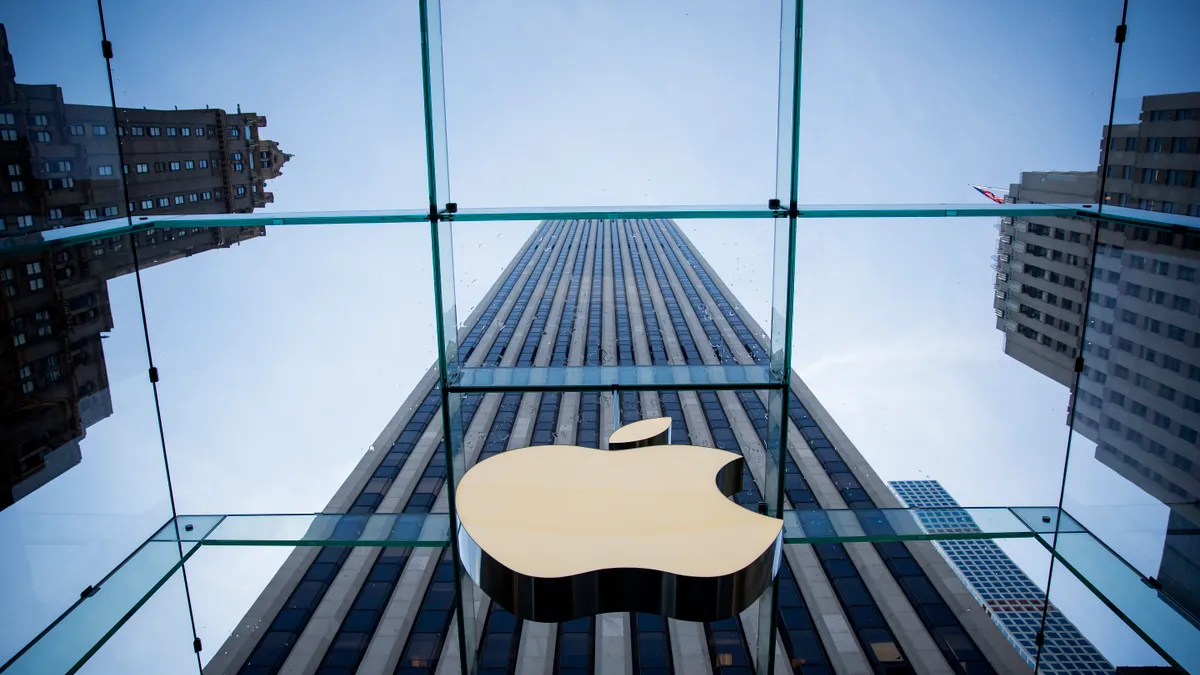Dive Brief:
- The way Apple has maintained its hold on the smartphone market is by imposing contractual restrictions on developers and withholding critical access points from developers in violation of Sec. 2 of the Sherman Act, the Department of Justice alleges in an antitrust enforcement action against the world’s second largest company by capitalization.
- “If left unchallenged, Apple will only continue to strengthen its smartphone monopoly,” U.S. Attorney General Merrick Garland said in announcing the civil antitrust lawsuit.
- “This lawsuit threatens who we are and the principles that set Apple products apart in fiercely competitive markets," Apple said in a statement.
Dive Insight:
In its 88-page complaint, DOJ says Apple is violating antitrust laws in a number of ways, including by 1) blocking apps that would make it easier for consumers to switch between competing smartphone platforms, 2) suppressing the development of apps that would enable high-quality streaming without the use of additional software, 3) excluding cross-platform messaging apps, 4) limiting the functionality of third-party smartwatches, and 5) limiting third-party digital wallets.
“For years, Apple responded to competitive threats by imposing a series of “Whac-A-Mole” contractual rules and restrictions that have allowed Apple to extract higher prices from consumers, impose higher fees on developers and creators, and to throttle competitive alternatives from rival technologies,” Assistant Attorney General Jonathan Kanter said in a statement. “Today’s lawsuit seeks to hold Apple accountable and ensure it cannot deploy the same, unlawful playbook in other vital markets.”
In its complaint, DOJ says the restrictions Apple places on developers enables it to profit at their expense.
“When developers imagine a new product or service for iPhone consumers, Apple demands up to 30 percent of the price of an app whose content, product, or service it did not create,” the agency says. “Then when a consumer wants to buy some additional service within that app, Apple extracts up to another 30 percent, again for a service Apple does not create or develop.”
Apple says DOJ is wrong on the facts and the law.
"If successful, it would hinder our ability to create the kind of technology people expect from Apple — where hardware, software, and services intersect,” the company said in its statement. “It would also set a dangerous precedent, empowering government to take a heavy hand in designing people's technology."
The complaint makes five claims against the company: 1) Monopolization of the performance smartphone market, 2) attempted monopolization of that market, 3) monopolization of the smartphone market, 4) attempted monopolization of that market, and 5) violation of the New Jersey Antitrust Act.
The complaint was filed in the U.S. District Court for the District of New Jersey and is joined by the attorneys general in New Jersey, Arizona, California, Connecticut, Maine, Michigan, Minnesota, New Hampshire, New York, North Dakota, Oklahoma, Oregon, Tennessee, Vermont, Wisconsin and the District of Columbia.
This is a developing story.











